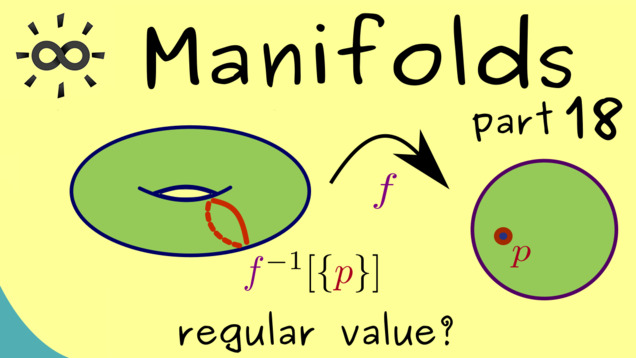
-
Title: Regular Value Theorem (abstract version)
-
Series: Manifolds
-
YouTube-Title: Manifolds 18 | Regular Value Theorem (abstract version)
-
Bright video: https://youtu.be/no3sLEZ9QKE
-
Dark video: https://youtu.be/gcRsbSl0Ge8
-
Ad-free video: Watch Vimeo video
-
Quiz: Test your knowledge
-
Dark-PDF: Download PDF version of the dark video
-
Print-PDF: Download printable PDF version
-
Thumbnail (bright): Download PNG
-
Thumbnail (dark): Download PNG
-
Subtitle on GitHub: mf18_sub_eng.srt missing
-
Timestamps (n/a)
-
Subtitle in English (n/a)
-
Quiz Content
Q1: Let $f: \mathbb{R}^2 \rightarrow \mathbb{R}$ be given by $f(x,y) = x^2 + y^2 - 1$. Is $f^{-1}[{ 0 } ]$ a submanifold?
A1: Yes, it is by the regular value theorem.
A2: No, 0 is not a regular value.
A3: No, the function is not well-defined.
A4: One needs more information.
Q2: One does one necessarily need for the abstract regular value theorem?
A1: Two smooth manifolds and a smooth map between them.
A2: One smooth manifold and a function on it.
A3: A regular value of a function $f: \mathbb{R} \rightarrow \mathbb{R}$.
Q3: Consider the set of matrices $${ A \in \mathbb{R}^{d \times d} \mid A^T = -A }$$ Is this a manifold?
A1: Yes, it’s of dimension $\frac{d^2 - d}{2}$.
A2: Yes, it’s of dimension $\frac{d(d+1)}{2}$,
A3: No, it is not.
-
Last update: 2024-10